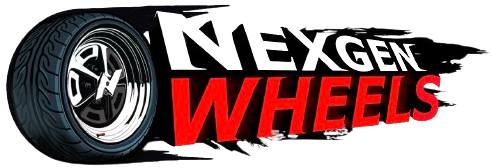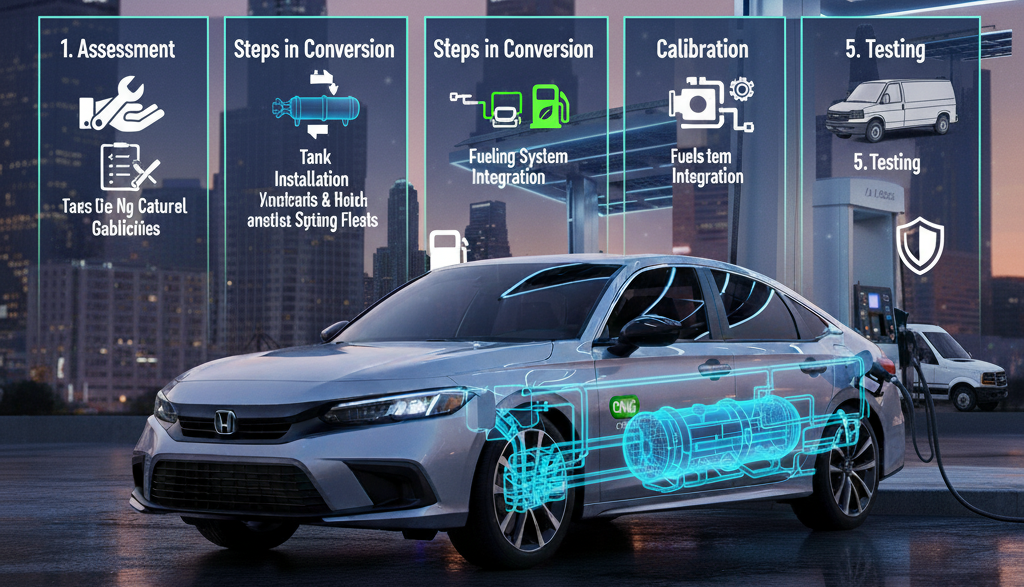The demand for cleaner, safer, and more affordable transportation solutions has grown rapidly over the past decade. Among the many alternatives to traditional fuels, natural gas vehicles (NGVs) stand out as a practical and cost-effective option. They combine reduced emissions, lower fuel costs, and long-term reliability. For individuals and fleet operators who already own gasoline or diesel-powered vehicles, retrofitting gasoline and diesel vehicles to run on compressed natural gas (CNG) provides a practical pathway to adopt this technology without investing in a completely new fleet.
This article explores how the conversion process works, the availability of NGVs, fueling options, safety standards, and why CNG technology is becoming an important part of the transportation industry’s future.
Why Retrofitting Matters
Purchasing brand-new natural gas vehicles is not always feasible for businesses or individual consumers due to budget constraints. However, retrofitting gasoline and diesel vehicles with certified CNG systems allows owners to keep their existing vehicles while enjoying the benefits of natural gas.
Retrofitting offers several advantages:
- Cost savings: Natural gas prices are typically lower than gasoline and diesel. Over time, the conversion pays for itself through fuel savings.
- Environmental benefits: Retrofitted vehicles produce fewer emissions, helping reduce a fleet’s overall carbon footprint.
- Energy security: Natural gas is abundant domestically, reducing reliance on imported oil.
By converting existing vehicles, owners make their fleets more sustainable without replacing them entirely.
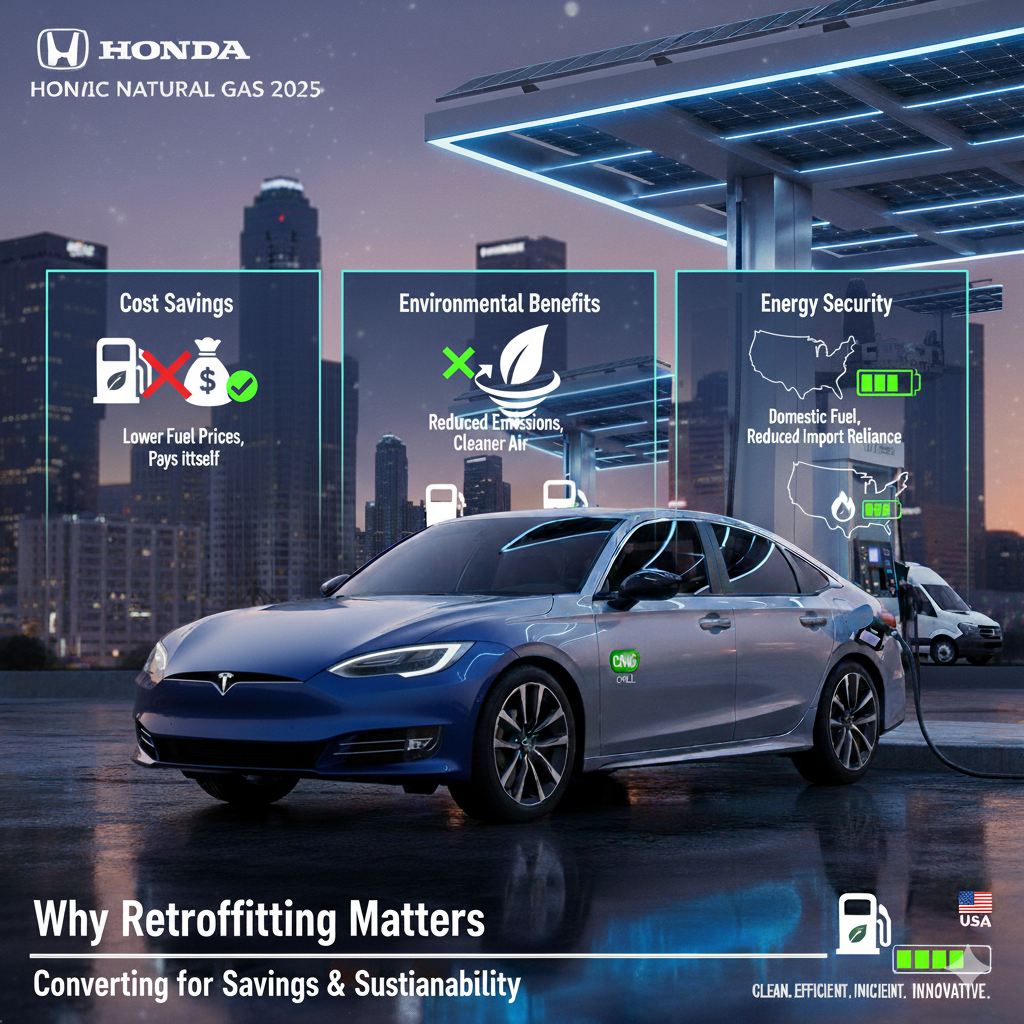
Natural Gas Vehicles Already in the Market
For those considering NGVs, it’s helpful to look at the options already available from automakers. Several manufacturers offer factory-built or bi-fuel vehicles that serve as benchmarks for retrofit systems.
- American Honda Civic Natural Gas Sedan: A pioneer in the consumer NGV market, this sedan uses a 1.8L engine with an 8-gallon gasoline gallon equivalent (GGE) tank, providing a range of 225–250 miles. It is widely used by fleets such as couriers, parking enforcement, and sales representatives.
- GM CNG Express: General Motors’ dedicated CNG vans, including the Express and Savana cargo vans, are equipped with a 6.0L V8 Vortec engine. With two tank configurations (23 GGE and 16 GGE), they are ideal for commercial operators requiring heavy-duty performance.
- Chrysler Ram 2500 CNG: This bi-fuel truck combines an 18.2 GGE CNG tank with a gasoline backup system, providing a total range of up to 367 miles. It demonstrates how CNG can deliver flexibility and power for long-distance fleet applications.
These models show that natural gas vehicles are reliable and versatile, with options for passenger cars, vans, and heavy-duty pickups. Retrofitting allows existing vehicles to achieve similar performance levels without buying new models.
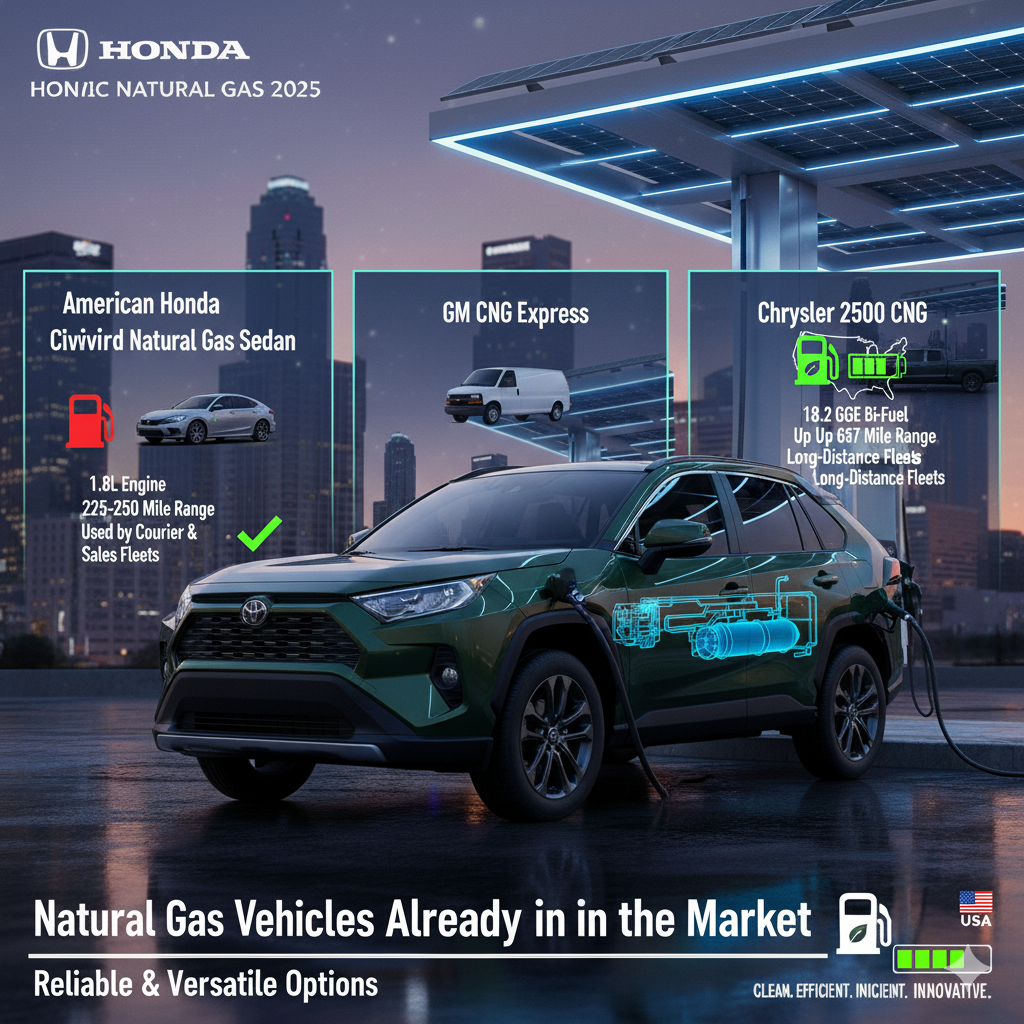
The Retrofitting Process
Retrofitting involves installing a CNG system that allows a vehicle to operate on natural gas, either in a dedicated or bi-fuel configuration. Certified conversion kits are designed to work seamlessly with the engine, ensuring performance remains comparable to gasoline or diesel.
Steps in Conversion:
- Assessment: A certified technician examines the vehicle to ensure it is compatible with retrofitting. Many models from Ford, GM, Dodge, and Isuzu are commonly converted.
- Tank Installation: High-strength CNG cylinders are installed, typically in the trunk, bed, or undercarriage.
- Fueling System Integration: Fuel injectors, regulators, and lines are added to allow CNG delivery to the engine.
- Calibration: The engine management system is adjusted to ensure proper combustion and efficiency.
- Testing: Vehicles undergo safety and emissions tests before being certified for road use.
Retrofitting must always be done by certified professionals, as incorrect installation can compromise both performance and safety.

CNG Fueling Options
The effectiveness of a retrofitted vehicle depends heavily on access to CNG fueling options. Fortunately, infrastructure is growing rapidly across the U.S. and globally.
- Fast-Fill Stations: These are similar to traditional gasoline stations, filling vehicles in minutes. They are essential for public use and fleets needing quick refueling.
- Time-Fill Stations: Fuel is dispensed slowly, often overnight. This option is cost-effective for fleets that return to a central depot daily, such as delivery vans and buses.
- Combo-Fill Stations: A hybrid solution that combines fast and time-fill, offering flexibility for fleets that may need both.
The expansion of fast-fill and time-fill stations ensures that retrofitted vehicles are practical for both fleet and consumer use.
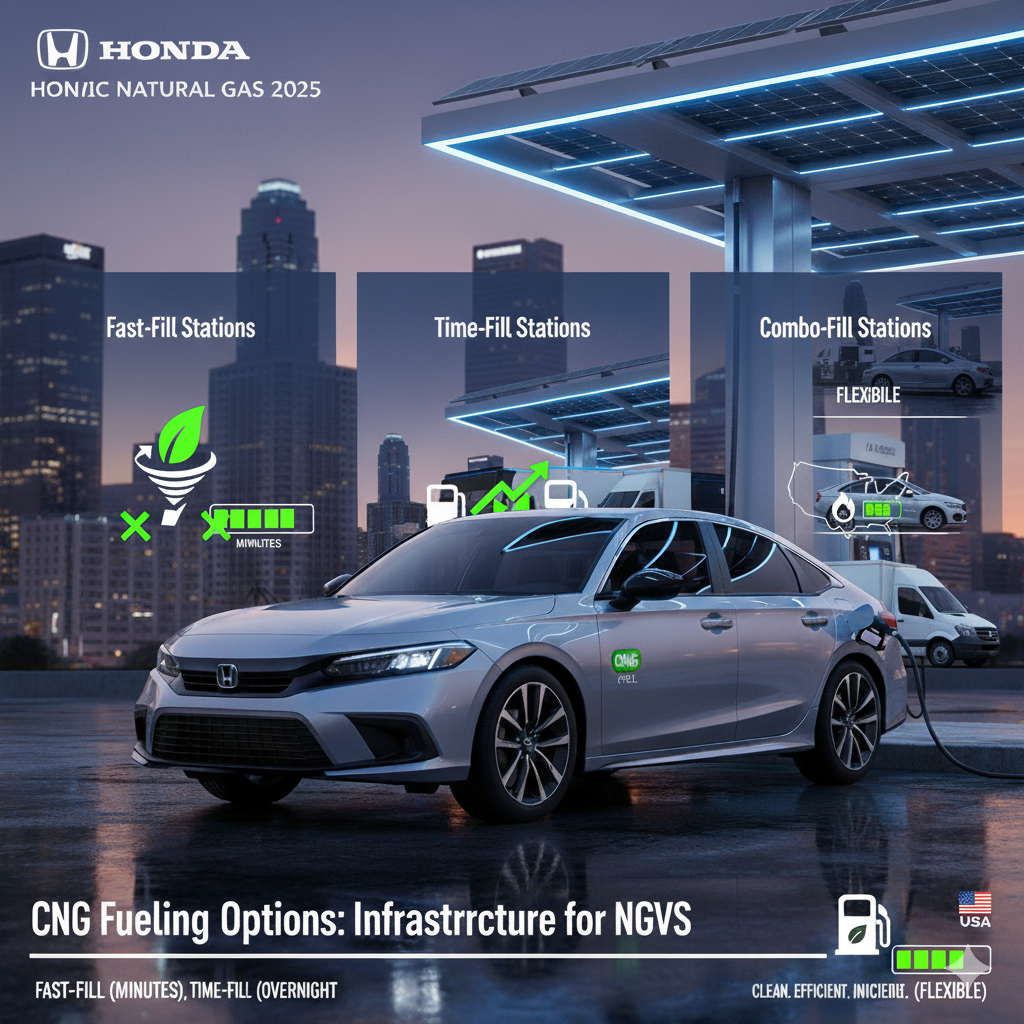
Benefits of Retrofitting Gasoline and Diesel Vehicles
Retrofitting provides unique benefits beyond just cost savings and emissions reduction:
- Extended Vehicle Life: Owners can continue using reliable vehicles while upgrading them to cleaner fuel technology.
- Flexibility: Bi-fuel systems allow vehicles to switch between CNG and gasoline, reducing concerns about fuel availability.
- Fleet Optimization: Companies can modernize large fleets gradually instead of replacing all vehicles at once, spreading out costs.
In addition, fleets that rely on local depots can install private fueling infrastructure, further lowering operating expenses.
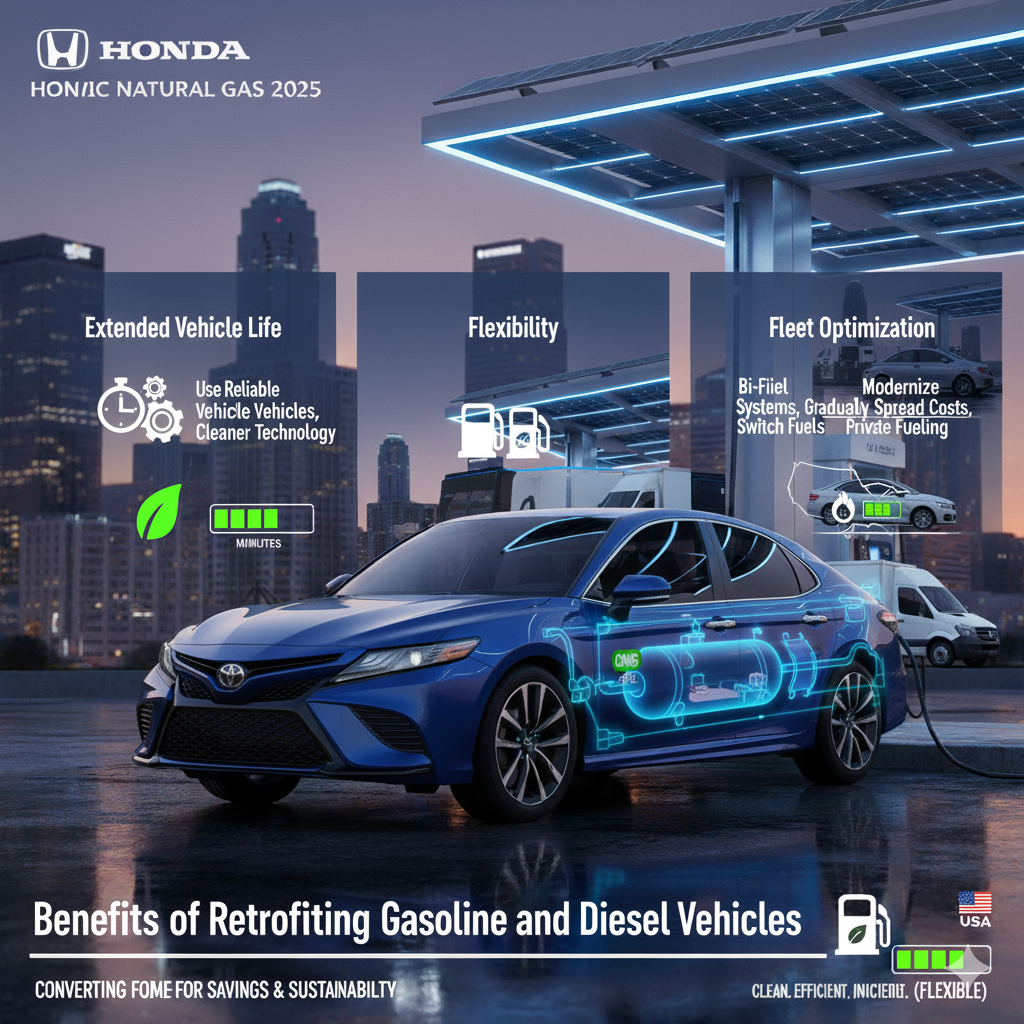
Future Growth of Retrofitted and Factory NGVs
The global shift toward sustainability ensures that both factory-built NGVs and retrofitted vehicles will see significant growth. Projections estimate NGV sales to increase by 25% annually, driven by environmental regulations, consumer demand, and infrastructure development.
- Policy Support: Many states offer incentives for conversion, including tax breaks and grants.
- Fleet Adoption: Delivery companies, municipal services, and corporate fleets are leading adopters due to cost benefits.
- Consumer Awareness: As fueling options expand, consumers are beginning to embrace CNG-powered cars and trucks.
Retrofitting will remain a critical part of this growth, providing a bridge for existing vehicles to transition into the natural gas ecosystem.
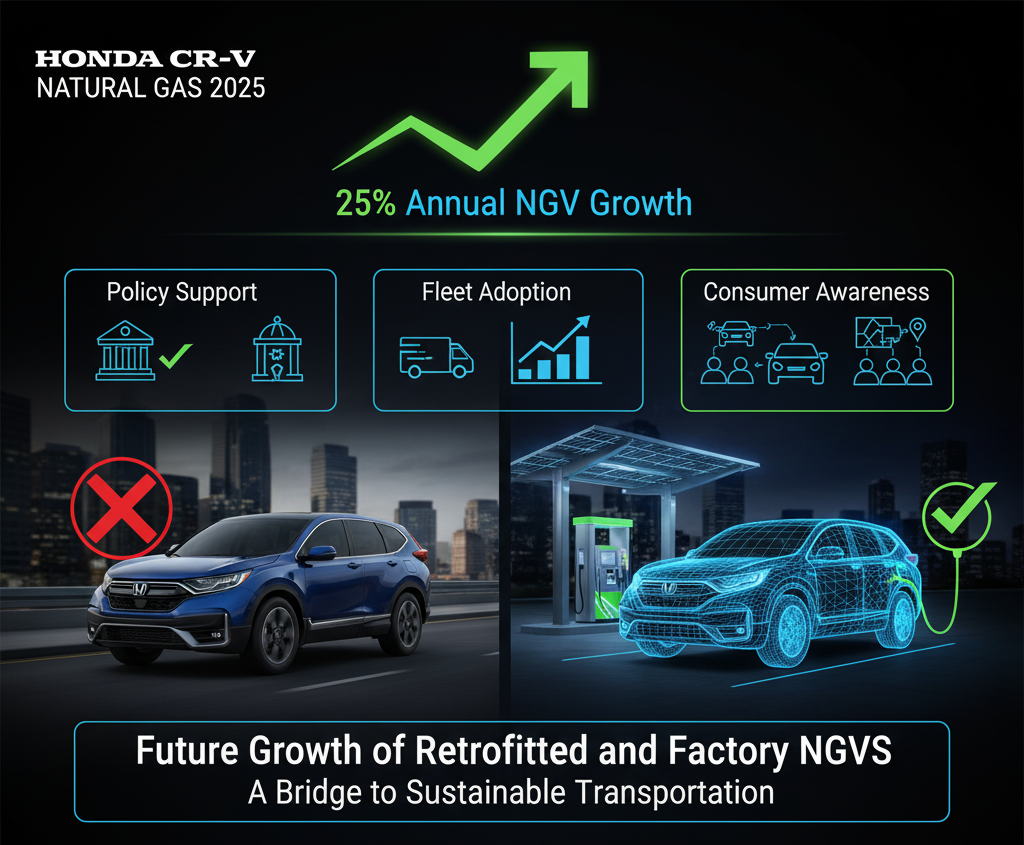
Conclusion
Converting existing fleets and cars through retrofitting gasoline and diesel vehicles is a practical solution for anyone interested in cost savings, environmental benefits, and energy security. With proven models like the American Honda Civic Natural Gas Sedan, GM CNG Express, and Chrysler Ram 2500 CNG setting benchmarks, retrofitted vehicles can achieve comparable performance and reliability. Supported by expanding CNG fueling options, including fast-fill and time-fill stations, and backed by strict natural gas vehicle safety standards, the conversion to CNG is both practical and secure.
As infrastructure continues to expand and technology advances, retrofitting will play a vital role in shaping the transportation industry’s future. For those seeking to understand and embrace this change, the opportunities are vast and growing. To stay updated on the latest in automotive trends and clean fuel solutions, keep exploring with nexgenwheels.

